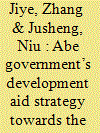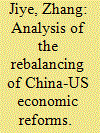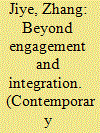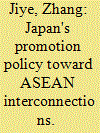| Srl | Item |
| 1 |
ID:
148162


|
|
|
|
|
| Summary/Abstract |
Since 1977 with the application of the Fukuda Doctrine to Southeast Asia, successive Japanese governments have continued a regional strategy of development aid. When Japan’s massive aid in the 1980s-1990s transferred Japanese manufacturing to Thailand under the“Flying Geese”paradigm intended to help developing countries catch up with developed ones, it was the major external factor in Thailand’s economic take-off and contributed to post-Cold War domestic stability in neighboring Laos, Cambodia and Vietnam. Beneficiaries of Japanese development aid, these countries introduced policies of reform and opening to the outside world. The Greater Mekong Subregional Cooperation Projects supported by Asian Development Bank (ADB) were at the hub of that progress.
|
|
|
|
|
|
|
|
|
|
|
|
|
|
|
|
| 2 |
ID:
137448


|
|
|
| 3 |
ID:
130610


|
|
|
|
|
| Publication |
2014.
|
| Summary/Abstract |
As part of its new strategy of "retuming to the Asia-Pacific region", the A Obama administration has adopted some tough economic policies towards China, notably promoting the Trans-Paci?c Partnership (TPP) and attempting to establish new rules of international trade and investment aimed at strengthening economic ties with other Western countries through the Trans-Atlantic Trade and Investment Partnership Agreement(TTlP ), both of which tend to compress the geopolitical space for China's economic rise. The administration is also using a 'green barrier' to suppress the development of China's high-tech industry, and using economic diplomacy and investment restrictions against Chinese state-owned enterprises. This paper seeks to examine and analyze the causes of shifts in the U .S. economic strategy towards China.
|
|
|
|
|
|
|
|
|
|
|
|
|
|
|
|
| 4 |
ID:
156338


|
|
|
|
|
| Summary/Abstract |
In Japan's support for ASEAN countries connection building can be seen its policy visions in functional positioning, geographical layout and connotation constitution. As part of a systematic policy framework, Japan supports ASEAN transregional and outside-regional connection with the Mekong subregion as focal point, pushes forwardmetropolitan interconnection of ASEAN countries with Jakarta a priority,promotes building infrastructure, develops rules, and constructs better external environments for connectivity, all while advancing its partnership for quality infrastructure to attract ASEAN countries coopeation.Because of Japan's economic interests and geopolitical strategy toward ASEAN countries, Japan's policy influence China's belt and road initiative and China should properly respond to Japan's actions.
|
|
|
|
|
|
|
|
|
|
|
|
|
|
|
|